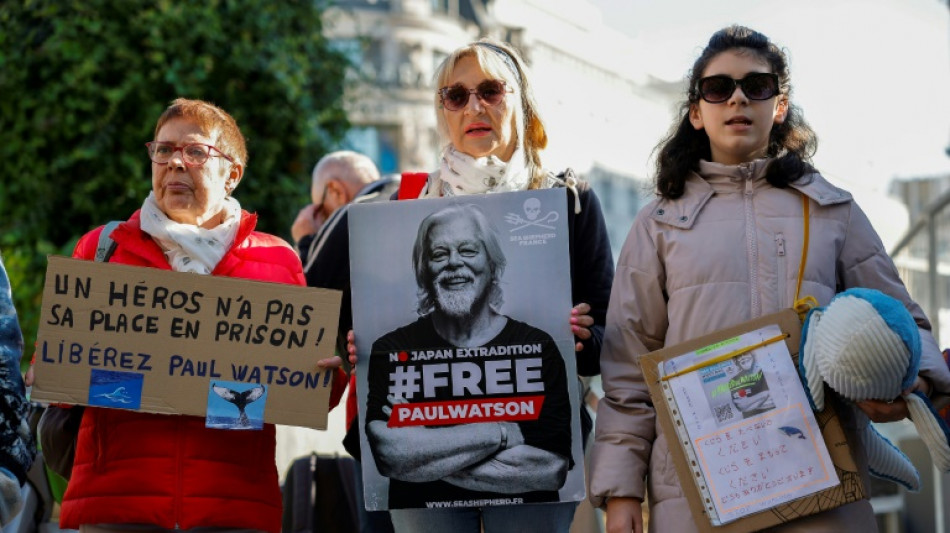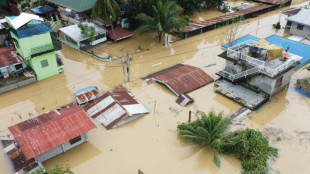

Fifth Greenland hearing for anti-whaling activist Watson
A Greenland court will decide Wednesday whether to further extend US-Canadian anti-whaling activist Paul Watson's time in custody pending a decision on his extradition to Japan, where he is wanted over an altercation with whalers.
"The public prosecutor has requested an extension of the custody period," the prosecutor in charge of the case, Mariam Khalil, told AFP in an email.
Wednesday's hearing will be Watson's fifth since his arrest in July in Nuuk, capital of the Danish autonomous territory.
The 73-year-old activist was detained on a 2012 Japanese arrest warrant, which accuses him of causing damage to a whaling ship in the Antarctic in 2010 and injuring a whaler.
Watson, who featured in the reality TV series "Whale Wars", founded Sea Shepherd and the Captain Paul Watson Foundation (CPWF) and is known for radical tactics including confrontations with whaling ships at sea.
He was arrested on July 21 when his ship, the John Paul DeJoria, docked to refuel in Nuuk on its way to "intercept" a new Japanese whaling factory vessel in the North Pacific, according to the CPWF.
Watson's lawyers said they expected the court to keep him in custody.
"We don't expect the Greenland court to change direction," said one of Watson's lawyers, Julie Stage.
She and the defence team have appealed the Nuuk court's previous rulings to Denmark's supreme court.
"The more time that passes, the greater the sense of injustice," said Lamya Essemlali, the head of Sea Shepherd France, who has travelled to Nuuk for each of Watson's hearings.
"In 10 days, it will be four months since he was jailed, which corresponds to the maximum sentence he would have been handed if he had been convicted," she said.
- Danish decision pending -
The Danish justice ministry has not said when it will announce its decision on the extradition request.
It recently received two reports it had been waiting for -- from the Greenland police and the Danish prosecutor general -- before making a decision.
"The ministry of justice is reviewing the extradition request and the two statements, and the ministry will, on that basis, make a decision in the case," it said in a statement to AFP.
If Denmark refuses his extradition, "there would no longer be any reason for detention and (Paul Watson) would be released as soon as possible after this decision was brought to the attention of the Greenland police," Khalil, the prosecutor in charge of the case, told AFP.
If Denmark were to agree to Japan's extradition request, Watson's lawyers would lodge an appeal.
Tokyo accuses Watson of injuring a Japanese crew member with a stink bomb intended to disrupt the whalers' activities during a Sea Shepherd clash with the Shonan Maru 2 vessel on February 11, 2010.
Watson's lawyers insist he is innocent and say they have video footage proving the crew member was not on deck when the stink bomb was thrown. The Nuuk court has refused to view the video.
In September, Watson's lawyers contacted the UN special rapporteur on environmental defenders, claiming that he could be "subjected to inhumane treatment" in Japanese prisons.
The defence team has argued that the crime of which Japan accuses him does not even carry a jail sentence in Greenland, a point on which the prosecution disagrees.
In a rare public comment on the case, Japan's Foreign Minister Takeshi Iwaya recently said the extradition request was "an issue of law enforcement at sea rather than a whaling issue".
Watson hopes to be freed to return to France, where he had been living since July 2023 and where his two young children go to school.
He requested French citizenship last month.
Watson's legal woes have attracted support from members of the public and activists, including prominent British conservationist Jane Goodall, who has urged French President Emmanuel Macron to grant him political asylum.
Japan, Norway and Iceland are the only three countries that still allow commercial whaling.
J.Moore--IP




